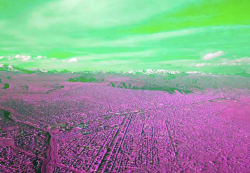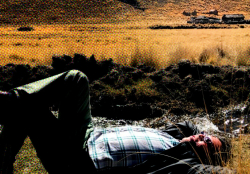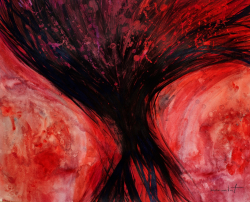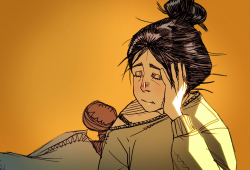
Orange wine

I think I'm not the only one who has engraved in the imagination that we lost access to the sea because of carnival festivities. Surely this statement makes most historians grumble, but it highlights that, in all likelihood, Carnival is one of the strongest pillars of national identity. The commemoration is the same, but it is celebrated differently in each part of Bolivia; I can't find a better example to define a plurinational country.
Of all the carnivals I experienced, the one that filled my heart the most was the last one, in Tarija. For an Andean like me, it was magical to witness so much joy in the traditional celebrations of compadres and comadres, in the parades where agricultural products rain down, and in the endless chapaca circles.
Amidst all the festive activities, I got to know my aunt Clotilde, a distant relative on my father's side. In her house, she was very excited, reminiscing about the antics of my young parent, but I wasn't paying much attention. All my focus was on a glass placed on the table. Its contents were impressive: the liquid displayed a vibrant orange color that subtly transformed into a dark crimson line. It looked like one of those fine cocktails you drink with your eyes.
I was forced to interrupt the anecdotes and ask what this striking drink was. Clotilde's daughter, amused by my surprise, replied that it was wine with Fanta. Nevertheless, I couldn't fathom the existence of something like that: the wine floated delicately on the soda. She quickly broke the spell, exclaiming, 'Don't think too much and just drink.' The taste was strange, but all first tastes are weird. The brain needs a bit of time to analyze what it's perceiving and decide whether it likes it or not. Mine was so absorbed in the preparation of that drink that it didn't care much about how it tasted, and I replied, 'It's good.'
I assumed that if I quickly emptied the glass, another one would be served, and that way, I could find out how that beautiful elixir was made. I also reasoned that I could simply ask them to teach me how to make it. The first thing Clotilde's daughter did was pour a splash of wine into the glass and then, with millimetric grace, filled the rest with Fanta. It was like watching a magician cutting his assistant in two; a work of art turned into a drink.
After that episode, I returned to La Paz to pack my bags; a new journey to the old world awaited me. I wanted to take advantage of one of my farewells, among family and friends, to have them taste that majestic drink, but I never succeeded. I lack the skill to serve liquors, and consequently, I wasted bottles everywhere. Anyway, those farewells are always bitter, and there's no drink that cheers them up. Although we can connect virtually now, distance always cools relationships. It's very different to send messages and videos than to sit at the same table, sharing a meal.
Almost at the end of the last meeting, my friend Abelardo, an Orurean who had spent a good part of his life in Italy, hugged me very excitedly and solemnly told me, 'I hope things go well for you in those lands. I spent beautiful years there. I just ask you a big favor: don't even think about serving wine with soda.'
The laughter lasted the entire trip and, in addition, left me pondering. Certainly, many purists argue that wine is drunk on its own, but as long as I can remember, Argentinians mix it with soda. Spaniards mix it with fruits to make their sangria, and both Germans and French boil it with herbs and spices during their winters. Clearly, in the old world, this drink is not very sacred either.
A few weeks after arriving in Brussels, I got to know Julien Ureel, a Belgian passionate about Bolivia. It's always very interesting to find a foreigner who loves your land; it becomes special because it elevates your national pride a bit, and you end up narrating the customs and traditions of the homeland with enthusiasm. Julien is part of an association called 'Friends of the Coca Leaf' and organizes activities in Europe to raise awareness about the consequences of anti-drug policies and, particularly, about the prohibition established against the sacred leaf.
Of all the conversations I had with Julien, the one that fascinated me the most was an anecdote about the life of Angelo Mariani, an Italo-French chemist who, about 150 years ago, created a tonic drink by mixing wine from the Bordeaux region with coca leaf extract. In those times, of course, the ancient leaf was not yet demonized. In fact, during the same period, the alkaloid of cocaine was isolated, making Sigmund Freud's nights more active, and many citizens alleviated their toothaches.
Now, Mariani was not only a skilled man of science, but he also had great merchant skills. He sent bottles of his wine to royalty, rulers, generals, and other celebrities of the time. When someone replied with a letter, he cleverly edited the texts and published them, along with corresponding photographs, in a series of newspapers and magazines. Thus, testimonials from Jules Verne, Alexandre Dumas, Thomas Edison, the Lumière brothers, and some popes appear in his advertisements.
Four or five years ago, the Frenchman Christophe Mariani — who has no relation to Angelo, despite sharing the same surname — decided to reissue that elixir. In his endeavor, he arranged for bottles identical to the originals to be manufactured and had labels printed reproducing those of the first elixir. However, this modern version includes an adjustment: the bottles no longer display the seal of 'Coca de Perou,' but that of 'Coca de Bolivie.'
Christophe took advantage of the fact that the Bolivian government was committed to an international crusade to decriminalize, commercialize, and industrialize the sacred leaf. Consequently, both he and Bolivian government officials used every available platform to exchange mutual praises.
However, it seems that a wine with coca no longer represents an appealing mix in this century. I have barely managed to obtain a couple of bottles of the new edition of Mariani wine. Everything indicates that, at least for the moment, commercial success eludes it. Nevertheless, distance and nostalgia will lend a different flavor to this historic French product. Now that I have it on my table, I find myself as captivated as when I had that orange wine before my eyes. Surely, drinking it will initiate a direct journey to the past, to the Yungas, and to the solitude of the night.




